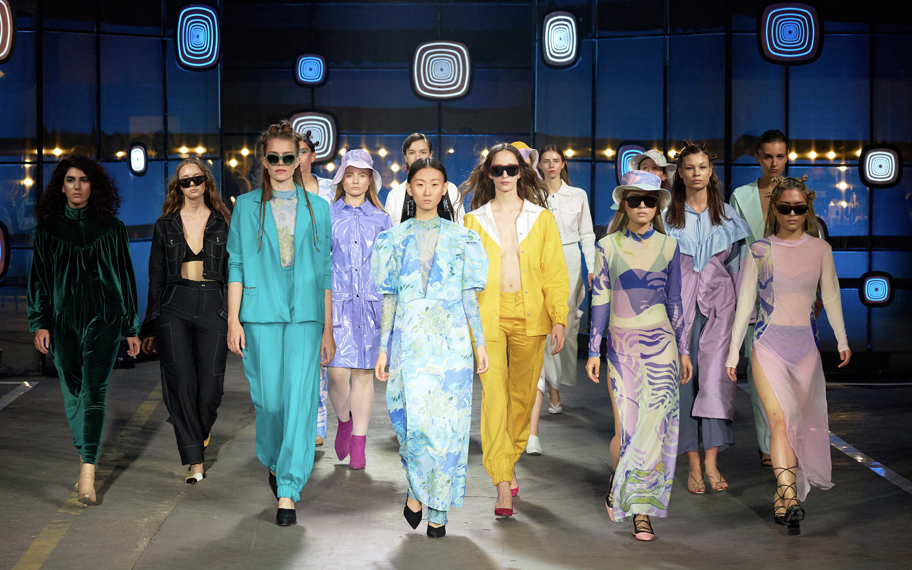The highlights of the fashion world - they line up almost seamlessly in the fashion weeks of New York, Paris, Milan or Tokyo. This spring, however, another venue joined them: the first Metaverse Fashion Week on the Decentraland platform. The virtual fashion week took place from March 24 to 27. Anyone who logged onto the Decentraland event platform with a digital avatar could take part. At Dolce & Gabbana, models with cat heads walked the catwalks, which attracted attention and stood out from the usual fashion stagings. Brands like Mango cooperated with crypto artists and had three digital artworks created for the Metaverse premiere. Estée Lauder or Dolce & Gabbana offered their designs in cyber stores in the form of digital wearables, but also for physical use. On a single day, the organizers reported a rush of 48,000 individual visitors. And people not only looked, but also bought: 7,065 wearables changed hands here. Brands like Tommy Hilfiger reported a sell-out of their NFTs during the Metaverse fashion show.
What seems like a digital parallel universe has opened up entirely new sales channels and creative possibilities for the fashion scene. At Berlin Fashion Week in early September, labels showed virtual clothing using augmented reality (AR) alongside events, runway shows and visits to design studios. This shows how far the Berlin tech scene has already reached into the fashion world.
Unlimited possibilities for creativity
"Web 3.0 concepts and applications offer completely new opportunities for fashion brands and independent creatives to stage their concepts and brands in a virtual world, creating new experiences and customer relationships. Unlike on an eCommerce platform, for example, where a product competes alongside thousands of others and stands out solely through product data and product visualization," says Marte Hentschel of Berlin-based sourcing platform Sqetch.
Sqetch is not only a service provider for labels looking for good material traders, but also advocates locally produced circular textiles and garments at the EU level. Its own platform promotes matchmaking between labels and producers and offers a tool for managing production. With its associated agency, the company also supports Berlin designers on their way to digital transformation as part of the "Digital Fashion Future Readiness Program".
Hentschel says, "Many good designs don't even make it to market because creatives and brands are confronted with the limitations of the physical world, such as supply bottlenecks and lack of material availability. In the virtual world, things are different. Here they can live out their creativity without restriction and customers experience entirely new designs and entirely new brand worlds."
Leo Hilse, founder of the Berlin-based company STYLE PROTOCOL, also sees the advantages:
"Design is redefined in virtual worlds. Those who copy and transfer designs from classic fashion into the metaverse will lose. Creativity is being rediscovered by designers and users in the metaverse - 3D worlds offer never-before-seen opportunities for artistic development."
Individuality in the digital-decentralized world
In the virtual world, stylistic boundaries can be explored anew. For example, the color of clothing can change or, on some avatars, simply burst into flames. And where everything seems to be digitally copyable, NFTs act as certificates of authenticity to mark the individual digital pieces. They are particularly popular among a young target group. Anyone who dresses their avatars in this way can be sure of wearing a unique piece through the metaverse.
Decentralized infrastructure for NFTs
However, to purchase the design pieces, whether digitally or physically, a separate wallet is required in the Metaverse to make payments with cryptocurrencies - and the labels the corresponding infrastructure for this. STYLE PROTOCOL offers a decentralized infrastructure here, making NFTs usable and licensable in any game or one of the various metaverses.
Also based in Berlin, LUKSO is developing a decentralized blockchain infrastructure to advance the digitization of the fashion world. Specifically, they are doing this with THE DEMATERIALISED, a marketplace for digital NFT fashion. Alexandra Ilg, product manager at THE DEMATERIALISED, is excited about this application:
"Digital fashion allows us to relate to clothing in a new way, both in terms of creation and use. Furthermore, NFTs and the metaverse in fashion form a completely new lens through which brands and also their customers can look at products. For example, very engaged communities can be created around these digital assets and experiences, and that's very exciting especially for a brand and also new digital fashion brands to build or expand their brand."
For Leo Hilse of STYLE PROTCOL, NFTs are really just the technical foundation for acquiring a coveted one-of-a-kind digital asset. For him, what matters when it comes to an implementation in the fashion sector is what a label wants to achieve if it intends to make an appearance in the metaverse. There is a challenge here: since there is not one metaverse or one blockchain ecosystem, labels should therefore find the right partners for the distribution of virtual goods for a smooth implementation. "The metaverse, virtual worlds and games offer a unique opportunity for brands to reinvent themselves for a young target group. Those who don't take advantage of it will regret it in the future," Hilse is certain. "New designers and virtual-only brands like RTFKT are already tapping into the market and can also stay one step ahead of big labels if they wait too long."
Together with the fashion tech start-up Yoona.ai, Style Protocol is also working on the fashion and lifestyle platform "The Berlin Metaverse". The platform sees itself as a catalyst for fashion and circularity and, in addition to digital conferences, is also planning fashion shows, showrooms and other exciting formats - all digital and online in the Berlin Metaverse. The launch is planned for January 2023.
For Yoona founder Anna Franziska Michel, NFTs and the Metaverse are the ideal combination for this new platform: "Metaverse and NFTs are for me the perfection of digitalization in our industry and finally the holistic digital value chain to new revenue streams exists." In addition to collaborating with STYLE PROTOCOL, Yoona offers technology that uses artificial intelligence to simplify design processes and make them more efficient.
Marte Hentschel from Sqetch highlights another aspect for more fashion in the metaverse:
"Design is democratized. Unlike in the physical world, where brands are based near fashion capitals to find infrastructures necessary for their operations, in the virtual world, proximity to infrastructures is removed. That means no matter where creatives are located, with access to low-threshold power, they can be part of blockchain and ecosystems."
All of these exciting developments and innovations reflect the disruption of the fashion industry. Even though the staging of shows and digital stores in the metaverse can still be more aesthetically sophisticated and run more smoothly, blockchain fashion events will step by step offer a new and exciting market. A glimpse of the potential growth and monetary opportunities that virtual goods can open up for the fashion industry is provided by the gaming industry, which already makes up to $100 billion in revenue annually from virtual goods. Web 3.0 represents the opportunity to shoot even more of this potential.
More information on the development of the fashion world in Berlin between sustainability and digitalization can also be found in this article.
Sources
Decentraland: https://decentraland.org/
LUKSO: https://lukso.network/
NFTs in the creative industry: https://blockchain.digital-bb.de/en/nfts-in-the-creative-industry-whats-happening-in-berlin
RTFKT: https://rtfkt.com/
Sqetch: https://www.sqetch.co/
Style Protocol: https://www.protocol.style/
Take it to the next level – Mode in Berlin: https://gruenderfreunde.de/take-it-to-the-next-level-mode-in-berlin/
THE DEMATERIALISED : https://thedematerialised.com/
Comparison with sales in gaming industry: https://www.harpersbazaar.de/fashion/mode-trends-metaverse-2022
Virtuelle Modewoche: https://www.textilwirtschaft.de/business/news/metaverse-kommt-in-mode-metaverse-235241
Yoona.ai: https://www.yoona.ai/
Yoonaverse / The Berlin Metaverse: https://www.yoonaverse.berlin/




